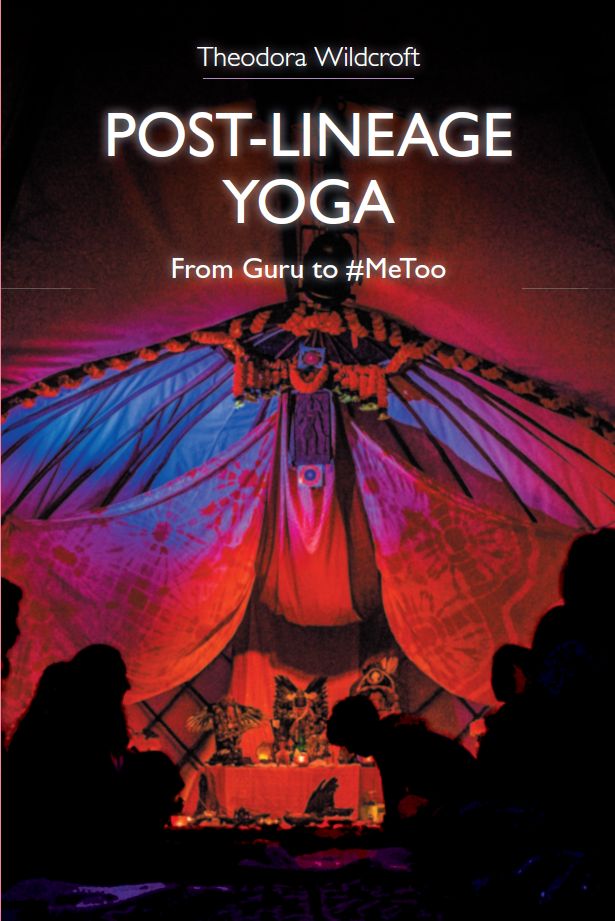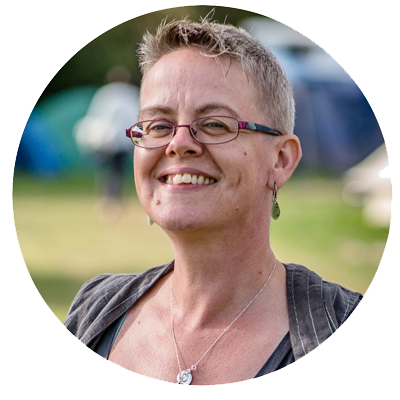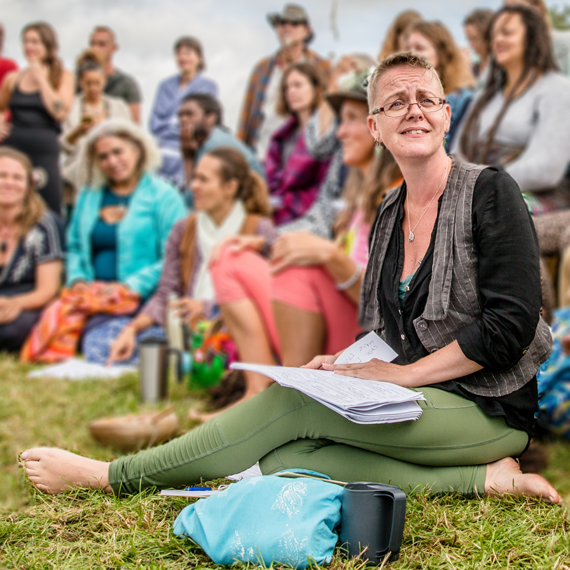Post-lineage Yoga – From Guru to #MeToo is a new book based on my PhD research into contemporary yoga. The official release date was 23rd November 2020 and copies are now available to order from the usual sources.
The concept of ‘post-lineage yoga’ presents a ground-breaking model for scholars to understand the contemporary teaching and practice of yoga, one where peer networks are more relevant than either brand loyalty or lineage affiliation.
Previous research has considered the history and science of yoga, but rarely the ways in which it has been shared. This book aims to change that. From the very advent of group classes, yoga teachers have dictated the movement, and experience, of their students.
But threaded through yoga’s history is a more democratic, individualised way of sharing practice with others. With the recent #MeTooinYoga movement, and the growing popularity of accessible yoga, teachers are increasingly turning to this hidden history for answers. In a diverse profession strongly resistant to official regulation, it is vital for scholars and policy makers alike to understand the risks and rewards of this development.
In 2004 there were estimated to be 2.5 million yoga practitioners in Britain alone, and numbers are still rising today. As more and more people enjoy the practice, this book asks: in communities based more on peer-networks than hierarchal leadership structures, how are the highest ethical standards negotiated?
How does practice relate to life off the mat?
What does best practice look like, in ‘post-lineage’ yoga?

A fascinating analysis of yoga subcultures, and the modern-day, ‘post-lineage’ yogis who operate on the fringes of the mainstream yoga marketplace, and outside traditional patriarchal structures of yogic authority. This highly original book is a milestone in the study of modern yoga.
Mark Singleton, author of Yoga Body: The Origins Of Modern Posture Practice
I recently gave a guest lecture on post lineage yoga for the University College Cork Study of Religions Research Seminar Series.
Publication information
Published by: Equinox Publishing
Pages: 270
Publication date: 23 Nov 2020
Paperback
ISBN-13: 9781781799406
List price: £26.95 / $35
Hardback
ISBN-13: 9781781799390
List price: £75 / $100
eBook
ISBN-13: 9781781799413
Individual price: £26.96 / $35
Institutional price: £75 / $100
Buy the book
From the publisher
Use the code EQX to get 25% off the price of copies direct from Equinox Publishing.
United Kingdom
bookshop.org and Amazon are affiliate links from which I will earn a small commission
US
Canada
Australia
A message
for yoga
teachers
This book should leave you asking above all: ‘where do we go from here?’
As you’ll see from my bio, I play many roles in yoga communities. I am a practitioner, and a teacher, a teacher trainer and also a researcher. That can be interesting and challenging to juggle at times.
I set out to describe and understand communities that are very close to me. I am excited to introduce you to some of the most interesting yoga practitioners that I know. I also need you to remember that they are chosen because of their position and effect within a particular community. Inclusion in this book is not based on any rank of ability or wisdom.
In the book I write not just about what I found, but how I navigated my own position within the practice. But in the course of researching my PhD, I was lucky to connect with hundreds of yoga teachers across the world. The concept I developed to understand the communities around me: post-lineage yoga, grew in importance and even gathered controversy. It has become important not just to help scholars understand the evolution of contemporary yoga, but also to help yoga teachers frame their experiences. I like to remind my fellow academics that yoga teachers do read and respond to their research. As a research population, your willingness for self-analysis, for continual learning, is precious and unusual. I have been touched by your support of my work in particular. This book, this PhD, is the product of a sangha, and I have too many people to thank for that.
However, little in yoga culture is politically neutral. As this book is published, I know there are those who would use the term ‘post-lineage yoga’ as a banner to rally around or against. As such, I need you to know that if you are a yoga teacher, this book will leave you with questions. As an academic text, this book cannot provide value judgements. It won’t tell you what is ‘authentic’ about contemporary yoga. It will only explain how you, as a group, negotiate what authenticity means.
I have been asked by many yoga teachers to write or co-write or collate a book on contemporary issues for yoga teachers – a synthesis of everything that yoga culture discourse is currently talking about, from trauma to accessibility, from cultural appropriation to consent, from standards to unions to teaching online.
I have promised to find a way to write that book next, and I will need your help to do it, because the expertise lies with you – knowledge is a product of communities, not individuals. But 2020 has been a difficult year to be answering that question. For now, I hope you can enjoy this book for what it is: a serious contribution to both scholarly understandings of contemporary yoga, and to contemporary yoga’s understanding of itself, but also a celebration of a complex, diverse, even contradictory culture of movement and stillness, self-realisation and community togetherness.
Book launch and other promotions
I expected to be promoting the book with in person events involving lots of face-to-face conversations and hugs. Clearly that’s not going to be happening at the moment. But I will be trying to get the word out through online events and podcasts.
The online book launch was hosted by the SOAS Centre of Yoga Studies on Monday 7th December 2020. You can view a video of the event on the SOAS Centre of Yoga Studies Youtube channel.
In August 2025, I spoke to Lauren Tober on her A Grateful Life podcast about my work, including Post Lineage Yoga.
It was so nice to have an excuse to talk to Seth Powell at length on Episode 19 of his Yogic Studies podcast.
I was interviewed about the book by Raj Balkaran for the Hindu Studies channel of the New Books Network.

About the author
Theo Wildcroft, PhD is a teacher, trainer, writer and scholar working for a more sustainable relationship between our many selves, the communities that hold us, and the world that nourishes us.
Her research considers the democratization of yoga post-lineage, and the many different ways yoga communities are responding to concerns about safety in practice. She is at the forefront of the movement for trauma sensitivity, diversity and inclusion.
In 2019, she completed her PhD with the Open University in Religious Studies, with the thesis title: Patterns of authority and practice relationships in ‘post-lineage yoga’
An accomplished writer with two decades of experience in group facilitation, she not only delivers compelling lectures and inspiring writing, but holds careful and thoughtful spaces for groups and individuals to deepen their knowledge, share experiences and acquire new skills.
You may also like …

Blog post
I blog regularly about various aspects of my work. This post, from April 2018, talks about the concept of post-lineage yoga, and how it emerged from my doctoral research.

Podcast
This conversation with Arundhati was for her Let’s Talk Yoga podcast. We talk about the difference between yoga lineages and styles; yoga festivales; and the moves towards standardization of yoga.

Book chapter
I contributed the chapter ‘Re-telling the self in personal practice’ about the fault lines between the experience and the presentation of yoga to the Routledge Handbook of Performance Philosophy.
Book acknowledgements
Just as raising a child takes a village, writing this book took a saṃgha. There are too many people to name them all. But special thanks go to:
Graham Harvey and Gwilym Beckerlegge for doctoral supervision above and beyond the call; to Mark Singleton, Suzanne Newcombe, Jason Birch and Jacqueline Hargreaves and the other scholars of the Hatha Yoga and AyurYoga Projects for friendship, mentoring and support; to Alison Robertson, David Robertson (no relation), Aled Thomas and the rest of the OU, BASR and RSP network, both early career and established academics, for inspirations, advice, collaborations and long conversations; and to Matthew Remski, Donna Farhi, Peter Blackaby and too many other yoga teachers and writers to mention, for being part of my own murmuration. And, of course, I give thanks to my editors and reviewers without whom this book would never have been published, and quite possibly still not have a proper title.
Above all, I thank my interviewees and my case studies, for their endless generosity, each and every one. I thank the Colourfest, Santosa, and Sundara saṃghas and so many other people I have spent sun-drenched, wind-swept, rain-washed days with, ‘doing yoga in fields with hippies’ as Graham puts it.
Finally, my unending love goes to my husband/handler Phil Wildcroft, who continues to provide caffeine regulation management and technical support.
About Theodora
Theodora Wildcroft is an associate researcher in the Department of Religious Studies at the Open University, founder member of alt-ac.uk, and former Co-ordinator for the Centre of Yoga Studies at SOAS, University of London, UK.
